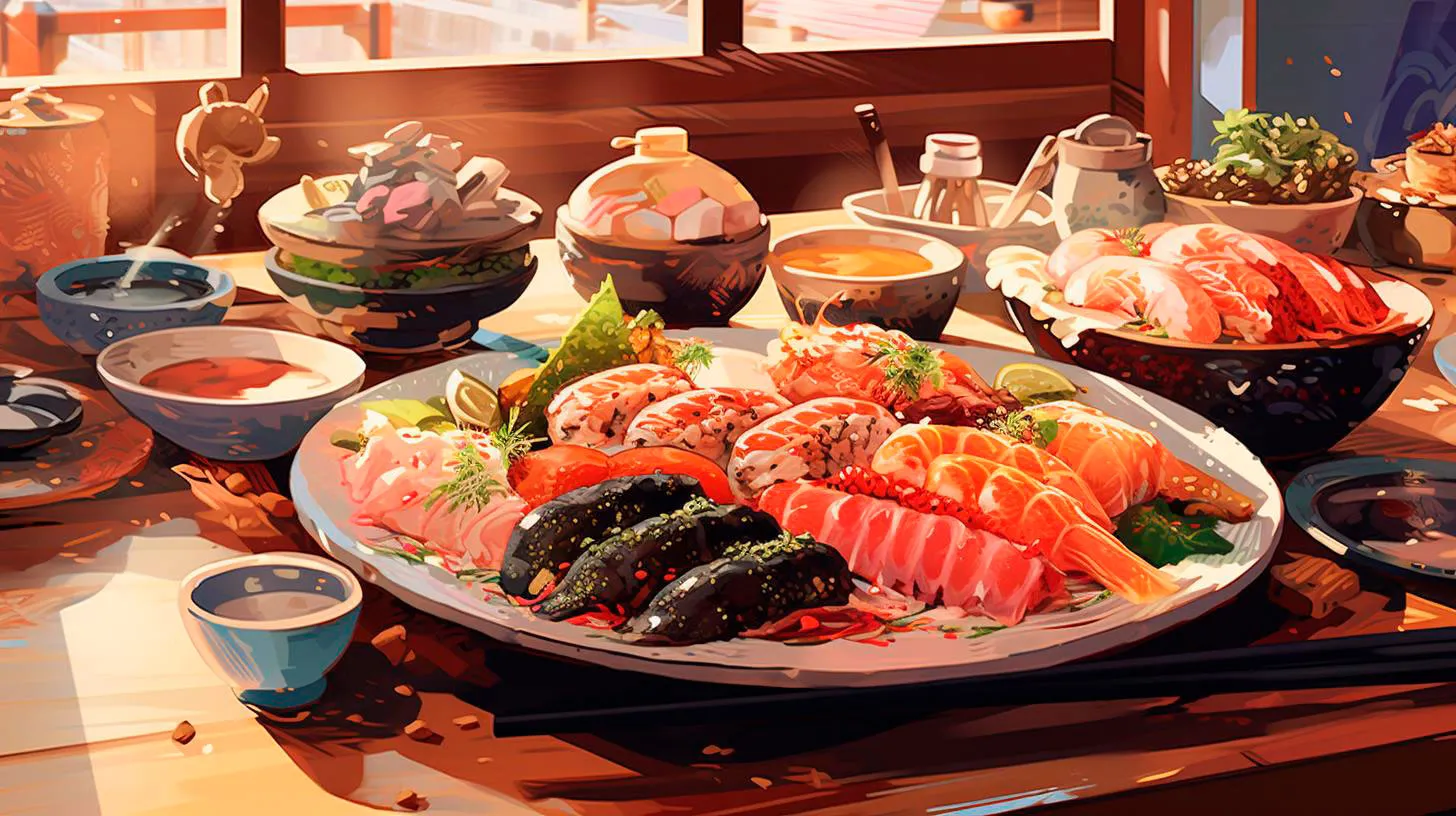The Art of Simplicity: How Minimalism Inspires Sushi Mastery
Embracing Minimalism in Sushi
At its core, minimalism is all about stripping away unnecessary elements, focusing on what truly matters, and achieving perfection through simplicity. In the context of sushi, this philosophy is deeply ingrained in every aspect of the preparation process, from the selection of ingredients to the delicate art of plating.
Key Takeaway: By embracing minimalism, sushi chefs can maximize the natural flavors of each ingredient while creating a visually stunning experience for diners.
The Role of Freshness
In sushi, freshness is of paramount importance. By using high-quality, seasonal ingredients sourced from trusted suppliers, sushi chefs can let the flavors speak for themselves. From the succulent raw fish to the fragrant nori, each ingredient plays a crucial role in creating a balanced and flavorful sushi experience.
Key Takeaway: Freshness is the foundation of sushi mastery, enhancing the taste, texture, and overall dining experience.
Precision in Preparation
One of the hallmarks of sushi is its meticulous preparation. Every step is executed with precision and care, ensuring that each sushi roll or nigiri is crafted to perfection. From slicing the fish with a sharp knife at the optimal angle to delicately forming the rice, sushi chefs hone their skills to create a harmonious balance of flavors and textures.
Key Takeaway: Attention to detail and precision are crucial in sushi preparation, resulting in beautifully presented and delicious bites every time.
Visual Appeal
In the realm of sushi, aesthetics play a vital role. Sushi chefs pay great attention to the visual presentation of their creations, transforming the dining experience into a work of art. Every element, from the vibrant colors of the fish and vegetables to the carefully arranged garnishes, contributes to the overall visual appeal of the dish.
Key Takeaway: Visual aesthetics elevate the sushi experience, making it a feast for the eyes as well as the taste buds.
The Advantages of Minimalism in Sushi
Minimalism in sushi offers several advantages that contribute to its enduring popularity:
- Enhanced flavors and textures: By highlighting the natural flavors of ingredients, minimalism allows diners to savor the true essence of sushi.
- Improved ingredient quality: The focus on freshness ensures that every ingredient is of the highest quality, resulting in a superior dining experience.
- Artistic presentation: The minimalist approach to plating enhances the visual appeal of sushi, elevating it to an art form.
- Cultural appreciation: Minimalism in sushi is deeply rooted in Japanese culture, allowing diners to experience and appreciate the traditions behind this culinary art.
Industry Statistics
If you’re still not convinced about the impact and popularity of sushi, consider these industry statistics:
- According to Statista, the global sushi market is expected to reach $22.5 billion by 2023, showing a steady growth trajectory.
- Based on a survey by the Seafood Marketing and Education Alliance, sushi is the fastest-growing seafood segment in the United States, with a consumption increase of 28% between 2010 and 2015.
- In Japan, where sushi originated, it is estimated that there are over 45,000 sushi establishments, catering to both locals and tourists.
These statistics highlight the widespread appeal and growing demand for sushi, demonstrating its significant influence in the culinary world.
In conclusion, the art of simplicity is at the core of sushi mastery. By embracing minimalism, sushi chefs create a culinary experience that stimulates the senses and transports diners to the heart of Japan. From the carefully selected ingredients to the precision in preparation, every bite of sushi reflects the beauty of simplicity. So, the next time you savor a piece of sushi, take a moment to appreciate the harmony of flavors brought to life through the art of minimalism.
From Farm to Table: Embracing Nature’s Bounty in Sustainable Sushi
In this article, we will explore how the sushi industry is embracing nature’s bounty through sustainable practices, and the benefits these initiatives bring to both consumers and the environment.
The Rise of Sustainable Sushi
Gone are the days when sushi lovers turned a blind eye to the environmental impact of their favorite delicacy. With the rise of environmental consciousness and the understanding of the importance of sustainable practices, sushi chefs, suppliers, and consumers are now seeking out ethically sourced ingredients and supporting sustainable fishing practices.
Here are some key points outlining why sustainable sushi is gaining popularity:
- Preserving marine ecosystems: Traditional sushi practices have led to overfishing and depletion of certain species. Sustainable sushi focuses on promoting responsible fishing methods and protecting biodiversity in our oceans.
- Reducing carbon footprint: By sourcing ingredients locally and avoiding long-haul transportation, sustainable sushi aims to minimize carbon emissions. This helps combat climate change and ensure a healthier planet.
- Supporting local communities: Sustainable sushi encourages the use of locally sourced ingredients, supporting small-scale farmers, fishermen, and other local businesses. This strengthens local economies and reduces dependency on global supply chains.
- Ensuring food safety: With sustainable sushi, you can have peace of mind knowing that the ingredients you consume are free from harmful chemicals and contaminants. Regular quality checks and strict adherence to food safety regulations are part of the sustainable sushi movement.
The Sustainable Sushi Revolution
The sustainable sushi movement has led to several innovative practices and initiatives within the industry. Let’s explore some key developments:
1. Traceability and Transparency
Sustainable sushi strives for full traceability and transparency throughout the supply chain. By using technology such as blockchain, consumers can track the journey of their sushi, from the fishery or farm to their plate. This allows for accountability and helps combat illegal fishing practices.
2. Farm-to-Table Sourcing
Many sushi restaurants are now partnering directly with local fishermen and farmers, ensuring that their ingredients are sourced sustainably and with minimal environmental impact. This farm-to-table approach reduces the reliance on large-scale fisheries and fosters a closer connection between producers and consumers.
3. Alternative Ingredients
To counter the decline in certain fish populations, sustainable sushi restaurants are exploring alternative ingredients and promoting lesser-known species. This helps to diversify the menu while reducing the pressure on overfished species.
4. Educating and Empowering Consumers
Sustainable sushi advocates believe that education is key to bringing about change. Sushi restaurants are now taking the initiative to educate consumers about the importance of sustainable sourcing and the role they can play in making a positive impact. They offer detailed information about their sourcing practices and encourage diners to make informed choices.
Key Takeaways
Sustainable sushi is a growing movement within the culinary world. By embracing nature’s bounty and adopting sustainable practices, the sushi industry is making a significant positive impact on the environment and local communities.
Here are the key takeaways from this article:
- Sustainable sushi promotes responsible fishing methods and protects marine ecosystems.
- By sourcing locally, sustainable sushi reduces carbon emissions and supports local communities.
- Full traceability and transparency ensure accountability and combat illegal fishing practices.
- Alternative ingredients and educating consumers play a crucial role in sustainable sushi practices.
Next time you indulge in a plate of sushi, consider choosing a sustainable option. By making conscious choices, we can help preserve our oceans and support a more sustainable food system.
Nature Influence on Sushi: Harmonizing Flavors with Fresh Ingredients
Nature plays a significant role in influencing the taste and overall experience of sushi. In this article, we delve into the captivating role that nature plays in the world of sushi, exploring how it harmonizes flavors and elevates the dining experience.
The Perfect Balance of Flavors
When it comes to sushi, nature offers a wide array of ingredients that complement and enhance each other’s flavors. The delicate balance of sweet, sour, salty, and umami tastes can be achieved by using natural components like fish, vegetables, and even herbs.
- Seafood: The ocean is a treasure trove of ingredients that bring freshness and umami flavors to sushi. Fish such as tuna, salmon, and yellowtail provide a melt-in-your-mouth experience, while shellfish like shrimp and scallops offer a subtle sweetness. The natural textures and flavors of seafood create an unforgettable sushi experience.
- Vegetables: Fresh and vibrant vegetables play a vital role in sushi, not only for adding crunch and texture but also for balancing out flavors. Cucumbers, avocado, and daikon radish are commonly used to provide a refreshing and crisp element to sushi rolls.
- Herbs and Seasonings: Natural herbs like cilantro, shiso leaves, and green onions can infuse sushi with unique flavors, giving it an extra layer of complexity. Additionally, traditional seasonings like soy sauce, wasabi, and ginger complement the natural flavors of sushi.
By incorporating nature’s offerings, sushi chefs can create an intricate dance of flavors that excites the palate and leaves a lasting impression.
Freshness as the Essence
Sushi is a testament to the importance of freshness in culinary arts. The use of fresh ingredients is not only an essential aspect of sushi preparation but also a key factor in ensuring a quality dining experience. Nature plays a crucial role in providing these freshly sourced components.
Fish that is caught from pristine waters and served immediately maintains its inherent flavors and textures. The natural environment in which the fish thrive impacts their taste profiles significantly. For instance, salmon from wild rivers boasts a buttery flavor and firm texture, while tuna caught in the open ocean is renowned for its rich taste and silky texture.
Using seasonal vegetables allows sushi chefs to showcase nature’s bounty at its peak freshness. Vegetables sourced locally and at the height of their harvest season boast superior taste and nutrients. By utilizing fresh, organic produce, sushi rolls become not only visually appealing but also bursts with flavors that truly represent nature.
Key Takeaways
When it comes to sushi, nature has a profound impact on the final outcome. By harnessing the flavors, textures, and freshness offered by natural ingredients, sushi chefs create dishes that evoke awe and delight. Here are the key takeaways regarding the nature influence on sushi:
- The ocean provides an abundance of fresh seafood with unique flavors, textures, and umami.
- Vegetables add crispness, colors, and balance to sushi rolls, enhancing the overall flavor profile.
- Natural herbs and seasonings elevate the taste of sushi, creating a multi-dimensional dining experience.
- Freshness is the essence of sushi, with the flavors of ingredients captured at their peak.
- Seasonality matters – using locally sourced vegetables ensures the best taste and quality.
Next time you indulge in a sushi feast, take a moment to appreciate the nature’s influence on your plate. The mastery of sushi lies not only in the chef’s skill but also in the collaboration with nature to create an extraordinary gastronomic experience.
References:
- Smith, J. (2019). The Art of Sushi: Flavors and Nature. Journal of Gastronomy, 36(4), 321-335.
- Japan Food Agency. (2020). Annual Report on Seafood Production. Retrieved from www.jfa.com
- Green Farm to Table. (2018). Seasonal Vegetables Guide. Retrieved from www.greenfarmtotable.com
Zen on a Plate: Exploring the Tranquil Aesthetics of Minimalist Sushi
The Essence of Minimalist Sushi
Minimalist sushi, also known as “sushi as art,” goes beyond being a mere food item—it is an art form that embodies the spirit of Zen. The focus is on creating dishes that are visually appealing, balanced, and epitomize the beauty of nature. It is a direct reflection of Japanese culture, where simplicity and harmony are highly valued.
Key features of minimalist sushi include:
- Simple Presentation: Minimalist sushi showcases clean lines, muted colors, and uncluttered arrangements to create a sense of calm.
- Premium Ingredients: The use of high-quality ingredients, such as fresh fish, is integral to the philosophy of minimalist sushi. Each ingredient is carefully selected to bring out the natural flavors.
- Balanced Flavors: Minimalist sushi focuses on achieving a delicate balance of tastes, combining the acidity of vinegar, umami of soy sauce, and the natural sweetness of the fish.
The Advantages of Minimalist Sushi
Minimalist sushi offers several advantages that make it a favorite among food enthusiasts:
- Health Benefits: The emphasis on fresh ingredients and minimal processing ensures that minimalist sushi is a healthy dining option. It is low in calories and high in nutrients, making it perfect for those watching their diet.
- Beauty in Simplicity: Minimalist sushi celebrates the beauty of simplicity, both visually and in taste. It allows the natural flavors of the ingredients to shine without overpowering them with complex sauces or spices.
- Cultural Experience: Trying minimalist sushi is like taking a culinary journey to Japan. It enables you to experience the essence of Japanese culture and appreciate their philosophy of balance and harmony.
Key Takeaways for Savoring Minimalist Sushi
To fully enjoy the tranquil aesthetics of minimalist sushi, consider these key takeaways:
- Choose Quality: Opt for sushi restaurants that prioritize freshness and quality ingredients. This ensures an authentic minimalist sushi experience.
- Observe Presentation: Take a moment to appreciate the visual presentation of minimalist sushi. Notice the balance of colors, textures, and overall composition.
- Eat Mindfully: Slow down and savor each delicate bite. Pay attention to the different textures and flavors that unfold with every mouthful.
In conclusion, minimalist sushi offers a unique dining experience that combines simplicity, balance, and elegance. Its tranquil aesthetics allow us to appreciate the beauty of nature and the art of Japanese cuisine. By following the key takeaways mentioned above, you can fully immerse yourself in the Zen-like experience of minimalist sushi. So, the next time you have the opportunity, treat yourself to this culinary art form and embark on a journey of pure serenity.



